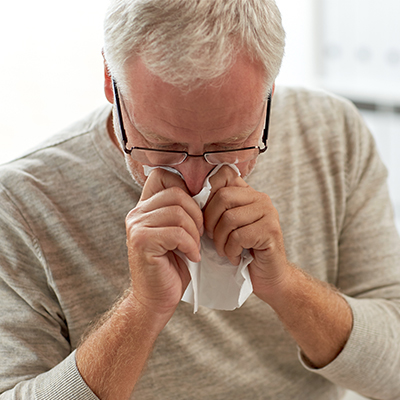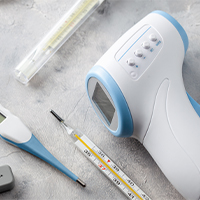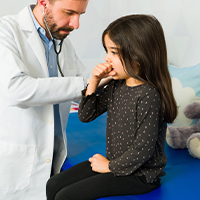What to Know About RSV
What Is RSV?
Respiratory syncytial virus (RSV) is a common and highly contagious respiratory virus that affects the lining of the respiratory system, including the nose, throat, lungs, and breathing passages. RSV spreads among people of all ages, including infants, with cold-like symptoms that can vary from mild to severe, including:
- Runny nose
- Decrease in appetite
- Coughing
- Sneezing
- Fever
- Wheezing
The majority of adults and children will encounter these symptoms in stages, over the course of 1-2 weeks. For most, RSV goes away on its own. But for some, especially the most at-risk populations – infants, toddlers, and older adults – the symptoms can intensify and even turn life-threatening.
How RSV Spreads
RSV is spread through droplets that can land in your eyes, nose, or mouth when an infected person coughs or sneezes. RSV can also be spread through skin-to-skin contact (such as kissing a baby’s face) and from commonly touched surfaces, like doorknobs.
A person with RSV can be contagious with RSV for about 3-8 days, and the virus can spread a few days before symptoms begin to appear. Infants and people with weakened immune systems can continue to spread RSV for up to four weeks.
RSV in Children

Like the common cold, RSV is so prevalent that nearly all children will become infected with the virus prior to age two. In infants, the symptoms can range from subtle changes, including irritability and decreased activity, to more obvious signs, such as difficulty breathing.
In some cases, RSV can lead to more severe infections, like pneumonia and bronchiolitis. Hospitalization is sometimes required to assist with breathing and hydration.
Call your healthcare provider immediately if your child is struggling to breathe, not drinking enough fluids, or symptoms are worsening.
RSV in Older Adults

RSV can be dangerous for older adults too.
Because the immune system can weaken with age, adults over 60 – and especially those with certain chronic medical conditions) – are more susceptible to serious complications from RSV.
In older adults, an RSV infection can cause a more serious lung infection or pneumonia. RSV can also lead to worsening of serious conditions such as:
- Asthma
- Chronic obstructive pulmonary disease (COPD)
- Congestive heart failure
In some cases, RSV in older adults can lead to hospitalization and even death. If you’re over 60, talk to your provider about the RSV vaccine.
How to Prevent RSV
An RSV antibody immunization is recommended for babies younger than 8 months and born during or entering their first RSV season. An RSV vaccine is recommended for certain adults over 60 and those who are 32-36 weeks pregnant during RSV season. To lessen the chance of spreading or becoming infected with the RSV virus, the following precautions should be taken:
- Stay home when you’re sick – and keep sick children home from school
- Cover coughs and sneezes with a tissue or your elbow
- Wash your hands frequently with soap and water for at least 20 seconds
- Avoid touching your face with unwashed hands
- Avoid close contact with others when you’re sick, such as kissing, shaking hands, and sharing cups and eating utensils.
- Clean frequently touched surfaces such as doorknobs and mobile devices.
Relieving RSV Symptoms
If you suspect you have RSV and you’re experiencing mild to moderate symptoms, follow the steps below. Remember to monitor for more severe symptoms, especially if you or your loved one is at higher risk for developing more severe symptoms that could require hospitalization.

Stay Hydrated. People with an RSV infection should drink plenty of non-caffeinated, non-sugary fluids, such as water or a favorite soup to prevent dehydration. If your loved one is refusing liquids, try smaller amounts more frequently. Mixing some juice in their water can help encourage them to drink. Opt for choices like apple or grape juice, as citrus juices like orange juice can irritate an already sore throat. Sugar-free popsicles or Jello offer hydration as well.

Reduce fever and pain with over-the-counter medications.
Acetaminophen or ibuprofen can address both fever and pain. Avoid giving aspirin to children without checking with your child’s provider.

Check in with your child’s healthcare provider before using nonprescription cold medicines.
Some medicines contain ingredients that may be unsafe for children.
Life-threatening RSV Symptoms
Seek immediate medical attention if you develop any of the symptoms below:
Adults
- Shortness of breath
- Wheezing
- Worsening cough
- High fever
- Trouble eating, drinking, or swallowing
- Bluish tint to the skin
Infants and Toddlers
- Poor feeding or appetite
- High fever
- Irritability
- Unusual fatigue
- Struggling to breathe or short, shallow breaths
Questions? Ask a Nurse

If you have immediate questions about specific symptoms, call Munson Healthcare Ask-A-Nurse at 231-935-0951. Our nurses are answering questions 24/7 at no charge to you.
